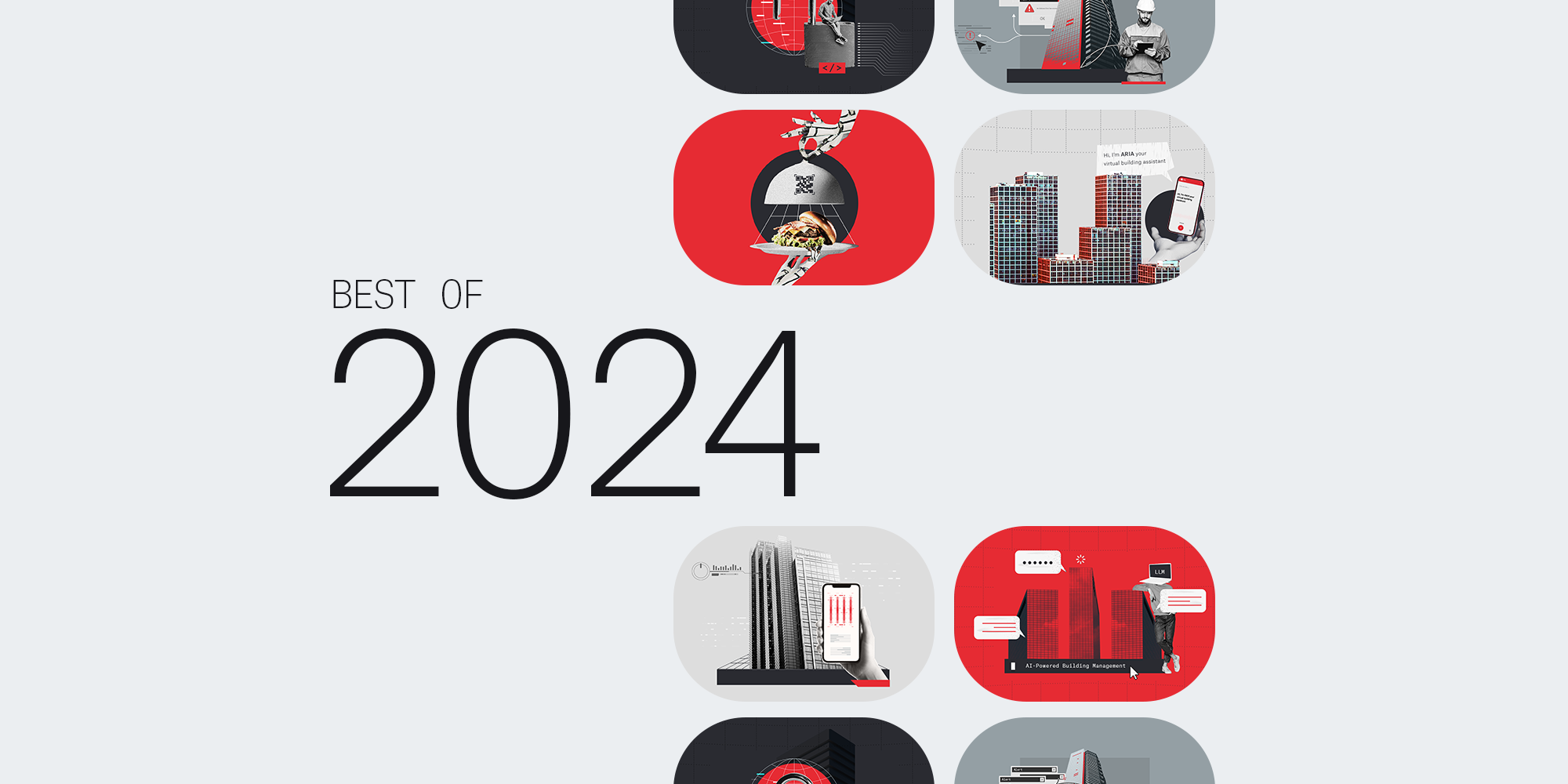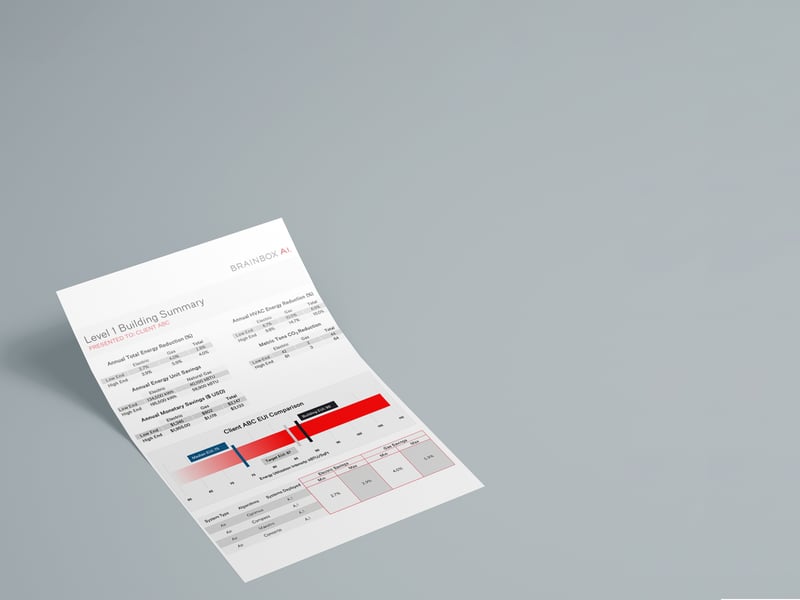Making your buildings energy-efficient with AI

Key takeaways
The energy sector's volatility pushes building facility managers to explore AI solutions for managing complex energy landscapes.
-
Energy Efficiency: Buildings account for a significant portion of global energy consumption, presenting potential savings of up to 29% by optimizing operations.
-
AI's Impact: AIs, like BrainBox AI, uses predictive analytics to optimize energy use, adapt to market changes, integrate renewables, enhance systems, and save costs.
-
Future Outlook: AI-powered buildings are becoming the norm, offering unprecedented control and autonomy while facility managers lead toward efficiency and cost-effectiveness.
-
Steps to Adoption: Assessing current systems, comparing EUI, and transitioning to an open protocol EMS will get make you ready to implement AI.
The energy sector is going through pubescent-level volatility. Fluctuating energy prices, regulatory changes, and the push towards sustainable resources are forcing building facility managers to navigate an increasingly complex energy landscape.
It’s no wonder, then, that those tasked with managing the lifeblood of our buildings are increasingly turning to emerging AI solutions to help lighten the load of making buildings more energy efficient.
The surge in energy efficiency
The statistics paint a compelling picture: Building operations account for 30% of global final energy consumption and 26% of global energy-related emissions (18% of which are due to indirect emissions from the production of electricity and heat). On top of this, a significant portion of this energy is being used inefficiently. In fact, so much energy is going to waste that the US Department of Energy suggests that simply optimizing building operations could reduce energy consumption by as much as 29%.
This presents a considerable opportunity for savings, especially when considering that the global building sector's energy use intensity (the energy used per square foot) is inching ever upward, indicating a vast area for improvement.
But for building facility managers, the potential for savings isn’t just about reducing costs; it's about enhancing the value of the buildings they manage and contributing to a more sustainable future. That said, realizing all this is easier said than done, given the outdated systems and the lack of actionable data in many existing buildings.
The impact of AI on energy management
An AI technology like BrainBox AI uses machine learning algorithms and data analytics to optimize a building’s energy use. What makes it such a powerful sidekick for modern energy management it that it’s able to work with existing infrastructure, constantly gathering data and analyzing it to identify patterns, inefficiencies, and potential improvements. Using predictive analytics, AI can also anticipate energy demand based on factors like occupancy patterns, weather forecasts, and electricity pricing, enabling facility managers to take proactive energy saving measures instead of having to react to inefficiencies after the fact.
The benefits of AI’s predictive abilities for a building’s energy manager don’t stop there.
They can also:
- Make energy systems more adaptable: AI's predictive capabilities allow energy systems to adapt to market fluctuations, like energy price spikes or drops, making them more resilient. This adaptability can translate to cost savings, as AI can adjust energy usage in real-time, ensuring operational continuity even when external conditions change.
- Uncover energy-saving opportunities: The heart of AI lies in its ability to process and analyze data at volumes no human could reasonably manage. By sifting through data from existing building management systems, AI can identify inefficiencies and suggest corrective measures, often identifying savings opportunities that would otherwise go unnoticed.
- Facilitate integration with renewable energy: AI can intelligently integrate renewable energy sources, like solar power, into existing systems. It can decide when to draw on stored solar energy versus when to use energy from the grid, optimizing the use of renewables and reducing reliance on non-renewable sources.
- Enhance current systems: AI doesn't necessarily require a complete overhaul of existing infrastructure. It can work with current systems to enhance their performance, extending the life of existing assets, and avoiding the costs and disruptions of major retrofits.
- Save on costs: Implementing AI can lead to significant cost savings, not just in energy consumption but also in maintenance and operational efficiency. By preventing overuse and unnecessary wear and tear on equipment, AI can also extend the lifespan of a building's infrastructure.
Simply put, AI provides a sophisticated approach to energy management that benefits facility managers by saving time, reducing costs, and enhancing the overall efficiency and resilience of buildings.
The future is intelligent: embracing AI for energy
All these benefits aren’t a distant reality either. Increasingly more buildings are being outfitted with state-of-the-art technology. In fact, AI-powered buildings are poised to become the new standard. In this future, buildings will not only consume energy but will also generate and store their own, becoming micro-power hubs within smart city grids. Predictive analytics will enable these buildings to anticipate and adapt to the needs of occupants, providing comfort, safety, and efficiency like never before – meaning facility managers will end up finding themselves at the forefront of this revolution, armed with tools that offer unprecedented insights and control over their environments. With this, they’ll be in the prime position to lead their buildings into a new era of sustainability, cost savings, and operational excellence.
Taking the first steps
To step into this future, facility managers can begin by assessing their current systems and identifying opportunities for integration with AI technologies. Engaging with AI technology providers like BrainBox AI can offer a glimpse into the potential efficiencies they offer.
These first steps might involve:
- Making an inventory of your building's systems, focusing on the equipment you have and the management of your data – where is it collected, stored, and used?
- Comparing your building's energy use intensity (EUI) with similar buildings in your region to gauge potential efficiency improvements. This comparison will help you recognize your building's potential for energy savings. To get started, request your personalized energy efficiency report here.
- Gradually shifting towards an open protocol energy management system, which offers interoperability, flexibility, and easier integration with a wide range of devices, including diverse AI solutions.
Starting with these actions, facility managers can ensure that their buildings are not just part of the future but are actively shaping it, mitigating the volatile effects of climate change on the energy sector and moving toward increased stability and energy efficiency.
Leading the charge with BrainBox AI
Ironically, this volatility in the energy sector, which presents such formidable challenges for building facility managers today, is what highlights the incredible potential and necessity of AI technologies in energy management. AI’s predictive analytics and machine learning capabilities offer more than just cost savings; they provide a pathway to more sustainable, efficient, and resilient buildings.


Get your free energy efficiency report
Within 2 business days, receive your building's Energy Use Intensity (EUI) score by providing us with some basic information about your building. In addition, the report will demonstrate where you stand in comparison to the median EUI of similar buildings in your region. The report also provides you with an assessment of potential energy and GHG emissions savings achievable with the addition of an AI technology to your HVAC system.
Every building is different. Tell us about yours.
We will produce the report only if the following conditions are met.













